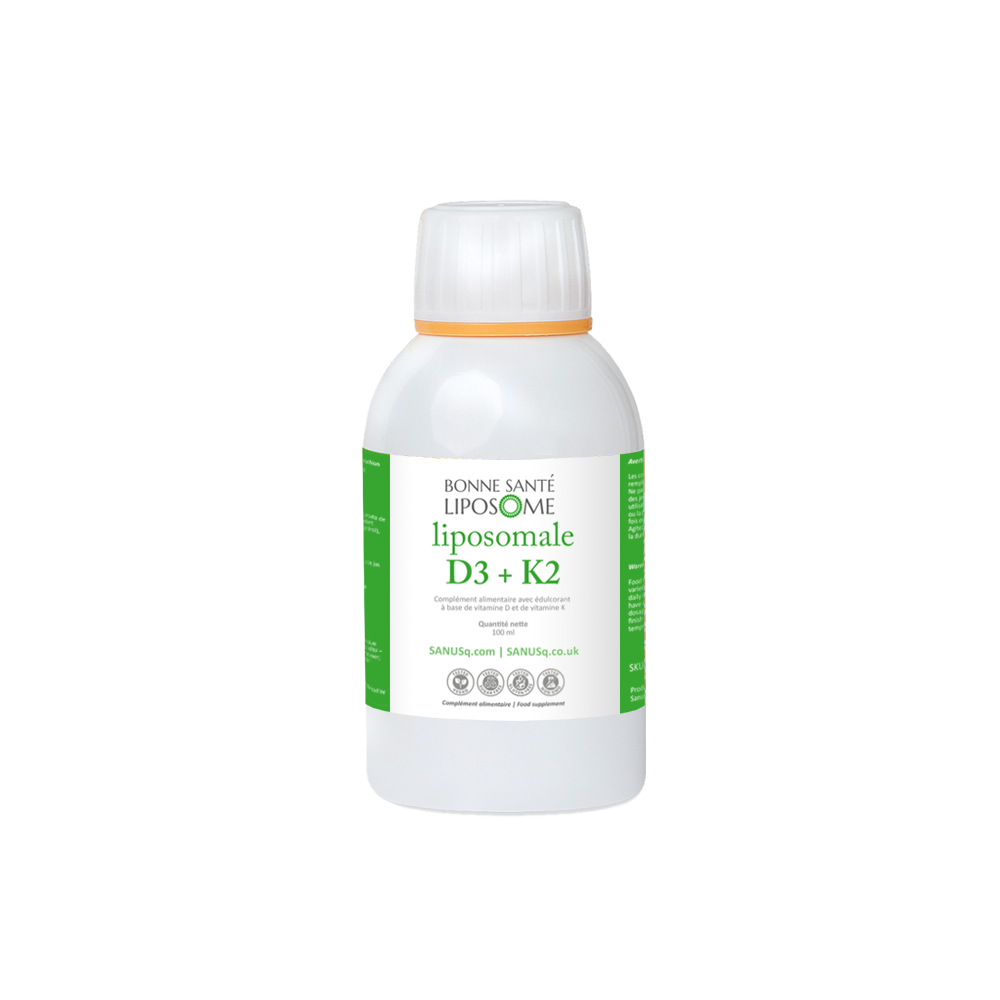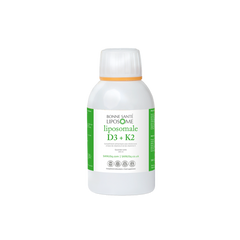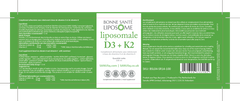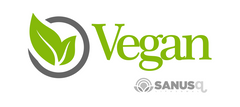Bonne Santé Liposome: Liposomal Vitamin D3+K2 (MK7) - 100ml
Liposomal Vitamin D3+K2 for strong bones and healthy heart
Current batch best before date: 31st January 2025
Country of origin: The Netherlands
(Check our current promotions before buying)
Main ingredients: (per 2 ml) 50 mcg (2,000 IU) Vitamin D3; 90 mcg Vitamin K2. Refer to label for full list of ingredients.
Suggested daily dosage: 1 x 2 ml directly in mouth or glass of water or juice, unless otherwise advised by a healthcare professional. Do not exceed recommended dosage. Discount bundle available (Click here)
Recommended serving size: 2 ml
Servings per bottle: 50
Storage: Store cool and dry. When opened store in refrigerator and finish within 2 months.
Product description PDF: View Here
Product description
- 2,000 iu Vitamin D3 and 90mcg Vitamin K2 per 2 ml serving
- Liposomal vitamin D3/K2 for improved bioavailability and absorption
- Vegan, Non-soy, Non-GMO, Sugar free, Gluten free
- Screw top bottle with measuring cup
K2+ D3 Health Benefits in a nutshell
- Reduces risk of heart disease
- Maintains healthy immune functions
- Reduces risk of autoimmune disorders
- Works as powerful anti-oxidant, lowers inflammation
- Keeps, bones, muscles and teeth healthy
Vitamin K2 and Vitamin D3 in more detail
Vitamin D3 helps you absorb calcium, a key mineral required for the formation of strong bones. But did you know you also need vitamin K2 to help this calcium reach bones? By doing so, vitamin K2 helps improve bone mineral density. Vitamin K2 also prevents calcium from getting into your soft tissues such as blood vessels. Excessive deposits of calcium in the arteries can contribute to atherosclerosis, hardening and narrowing of arteries that can block the blood flow. Atherosclerosis increases your risk of angina, heart disease and stroke. While a healthy diet and exercise can help prevent or reverse the risk, taking supplements that may reduce calcium build-up in the arteries and reduce inflammation can be very useful too.
Together, vitamins D3 and K2 make sure the body can use calcium properly and more effectively. This supports bone and heart health.

Vitamin D3: How it works?
Vitamin D is well-recognized for its role in regulating calcium levels and forming strong bones. Whether you are getting calcium from your diet or through supplements, it needs to be absorbed and that’s where vitamin D helps. Vitamin D is also known for many other important health benefits. This is how it works:
- Almost every cell of your body has receptors for vitamin D. These receptors, called VDRs, are present in the cells of the intestines, heart, breasts, lungs, hormone glands, thyroid glands, immune system and muscles.
- The active form of vitamin D binds to these receptors and activates various genes, responsible for making all kinds of proteins and enzymes, which tell the body how to work.
For example, VDRs in the intestines bind to the vitamin D, get activated and will activate genes that help the body absorb calcium and phosphorus. Similarly, when vitamin D binds to the receptors in the cells of the immune system, this process activates genes that stimulate the production of anti-bacterial proteins to fight infections.
Vitamin D3: Health benefits
- Helps in calcium absorption, required for strong, healthy bones
- Prevents osteoporosis
- Regulates immunity
- Helps the body fight infections
- Reduces risk of autoimmune disorders [1]
- Reduces risk of respiratory infections, asthma and allergies [2-3]
- Lowers the risk of heart disease
- Reduces inflammation
Long-term vitamin D3 deficiency is a risk factor for many serious health conditions – such as osteoporosis, heart disease, eye disorders (diabetic retinopathy, dry eye, macular degeneration and myopia), asthma, respiratory infections, chronic pain, fibromyalgia, arthritis, poor cognitive functions, depression, diabetes, pregnancy complications, and autoimmune disorders (thyroid disease, IBS, lupus and rheumatoid arthritis). Vitamin D 3 deficiency in pregnancy may increase the risk of allergies, asthma, wheezing disorders and even autism in the babies
Your body can make enough vitamin D3 in the presence of sunlight. But both adults and children are increasingly spending less time outdoors. Increased use of sunscreen and the fear of developing skin cancer also limit sun exposure, that has resulted in widespread deficiency. In addition to inadequate sun exposure, old age, obesity and kidney disorders also cause vitamin D deficiency. Magnesium also plays an important role in the proper absorption and utilization of vitamin D in the body and its deficiency can also lead to low vitamin D levels. Taking high quality liposomal vitamin D3 can help you maintain healthy levels and reverse the shortage that is associated with weak bones, poor immunity and autoimmune disorders.
Vitamin K2: How it works?
There are two types of vitamin K – K1 and K2. And that both have different functions? While both vitamins are needed for healthy blood clotting, it is vitamin K2 that plays a more important role in supporting your bone and heart health. It is because vitamin K2 controls where the calcium goes. Vitamin K2:
- Activates osteocalcin, a protein that binds calcium in the bloodstream and takes it to the bones
- Activates Matrix Gla-protein (MGP), a protein that prevents calcium from getting accumulated in soft tissues, such as arteries, kidneys and muscles
- Functions as an anti-oxidant
Vitamin K2: Health benefits
- Improves bone health
- Reduces the risk of osteoporosis and fractures [4-5]
- Reduces the risk of heart disease [6-8]
- Helps in healthy blood clotting
- Improves health in post-menopausal women
- Lowers inflammation
- Improves insulin sensitivity
Vitamin K2 is primarily found in fermented foods like natto, sauerkraut and cheese. Organic, grass-fed animal products, especially liver, egg yolk and butter, are also a good source of K2. However, it is not possible to get a sufficient amount of K2 from your diet alone, especially if it is lacking in fermented foods. In addition, ageing, long-term use of antibiotics and statins, liver disease and gastrointestinal disorders such as Celiac or Crohn’s disease can make you K2 deficient. In these cases, a reliable liposomal vitamin K2 supplement is your best choice to prevent vitamin K2 deficiency.
Bonne Sante Liposome Vitamin D3+K2
- Better absorption and bio-availability of nutrients
- Direct transportation of nutrients to the target cells, without any loss or degradation during digestion
Precautions
This product does not replace a healthy, wholesome diet. It is meant to be used as a dietary supplement. Always consult your doctor before using any supplement, especially if you are already taking prescribed medications or herbal supplements.
Consult your doctor if you are pregnant or breastfeeding, and to determine if the supplement is suitable for children.
References:
- Hahn et al. Vitamin D and marine omega 3 fatty acid supplementation and incident autoimmune disease: VITAL randomized controlled trial. BMJ 2022
- Jolliffe et al. Vitamin D supplementation to prevent acute respiratory infections: a systematic review and meta-analysis of aggregate data from randomised controlled trials. The Lancet. Diabetes and Endocrinology. 2021.
- Martineau et al. Vitamin D supplementation to prevent acute respiratory tract infections: systematic review and meta-analysis of individual participant data. BMJ, 2017
- Katarzyna Maresz. Proper Calcium Use: Vitamin K2 as a Promoter of Bone and Cardiovascular Health. Integr Med (Encinitas). 2015
- Huang et al. Does vitamin K2 play a role in the prevention and treatment of osteoporosis for postmenopausal women: a meta-analysis of randomized controlled trials. Osteoporos Int. 2015
- Knapen et al. Menaquinone-7 supplementation improves arterial stiffness in healthy postmenopausal women. A double-blind randomised clinical trial. Thromb Haemost. 2015
- Mansour et al. Vitamin K2 supplementation and arterial stiffness among renal transplant recipients-a single-arm, single-center clinical trial. J Am Soc Hypertens. 2017
- Hariri et al. Vitamin K2—a neglected player in cardiovascular health: a narrative review. Open Heart 2021.
Disclaimer
Information on our websites, in our blogs and our emails are provided for informational purposes only, and have not been evaluated by the EMA, EFSA or FDA. It is not meant to substitute medical advice provided by your healthcare professional and is not intended to diagnose, treat, cure, or prevent any disease. Our products are intended for adults, 18 years of age and older. While Vitamin D3+K2 has been shown to have various health benefits, it is important to remember that supplements and dietary changes should be considered as part of an overall health plan and not as a substitute for professional medical treatment. Only a qualified healthcare practitioner can provide personalized advice and treatment plans based on your individual health needs and medical history, and you should seek advice from your healthcare professional before taking product(s) if you are pregnant or nursing.












 Pin it
Pin it